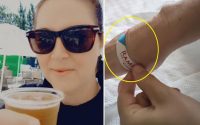Tourists conned into single $500 pasta dish in France
It was a real faux pas-ta.
Twin sisters from Wisconsin experienced the con of a lifetime when they were duped into paying more than 500 euros — about $530 — for a shrimpy-size dish of lobster pasta while vacationing in the south of France.
Travel influencers Cassidy and Leah Armbruster, who now call Madrid, Spain, home, shared their gripe Sunday on TikTok with the simple caption, “You live and you learn.”
The pair, along with some college friends, were out on a boat when their food order became lost in translation.
“There was a restaurant boat driving around selling food. We actually weren’t going to order anything because we brought snacks, and then thought we could split a pizza. But it was September 1, and they stopped selling pizza the day before, since the tourist season was coming to an end,” one of the sisters told Newsweek.
A friend innocently suggested sharing some pasta seaside.
“We said sure, why not, assuming it would be a normal-priced pasta,” one of the sisters added. “The boat said, ‘We will be back in an hour,’ and when they came back with the pasta, they insisted we pay for it.”
The situation was so absurd that even a local defended the less-than-aware Americans.
“The [boat] captain was French and argued with the restaurant boat for charging us that much,” one of the twins revealed.
Ultimately, a friend surrendered to pay the bill to avoid an international incident.
The Post reached out to Cassidy for comment.


“Y’all were robbed lol,” one TikToker commented, while others called out a lack of logic on the ladies’ end.
“You could have asked for the price upfront?” another wrote, prompting the Armbruster sisters to respond, “We learned that lesson the very very hard way.”
The not-so-nice situation not far from Nice is one of many recent tourist scams in Europe.
DK Oyster, a notorious Mykonos eatery known for duping foreigners, recently charged a Montana couple around $800 for some light noshes and a cocktail.
Officials in Greece have also warned that bars in Kavos were recycling old, unfinished drinks to new customers.


